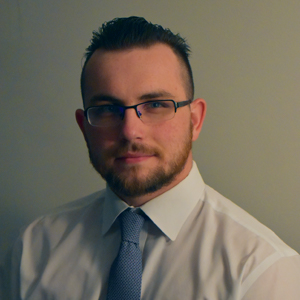Tony Kelly, ’17, is using A.I. to develop projects in the Applied Physics Laboratory at Johns Hopkins University.
Shortly after joining the Johns Hopkins University Applied Physics Laboratory (APL) as a data scientist in late March 2021, La Salle University graduate Tony Kelly, ’17, began working as part of the team feeding the Johns Hopkins’ Coronavirus Resource Center — a website that provides the most accurate data available on the COVID-19 pandemic’s spread. It has served as a go-to resource for government agencies, public health departments, and news outlets over the last year.
Researchers at APL provide data collection, curation and aggregation for the site, which was developed by Johns Hopkins Whiting School of Engineering associate professor Lauren Gardner shortly after the first cases of COVID-19 were reported in China. A newcomer to the team, a year into the pandemic, Kelly was tasked with helping to build and maintain the infrastructure that navigates the ever-changing landscape of COVID related data.
“It’s really exciting to join such an impactful team,” said Kelly, who earned his bachelor’s degree in information technology from La Salle, later receiving an M.S. in computer science from Johns Hopkins in 2020. “Before I joined the Laboratory, I obviously knew how important this data source had become around the globe in tracking the pandemic. To be even a small part of that effort is humbling.”
 Kelly is part of APL’s Large Scale Analytics Group, which focuses on helping decision-makers operate at speed and scale through advanced analytics and artificial intelligence (AI) based approaches. As the largest university-affiliated research center in the country, APL serves as an “engine room,” as Kelly put it, solving complex research, engineering and analytical problems in trusted service to the nation. The Laboratory was founded in 1942 to aid a country at war, and invented a radar proximity fuze that was later judged to be among the three most valuable technological developments of World War II.
Kelly is part of APL’s Large Scale Analytics Group, which focuses on helping decision-makers operate at speed and scale through advanced analytics and artificial intelligence (AI) based approaches. As the largest university-affiliated research center in the country, APL serves as an “engine room,” as Kelly put it, solving complex research, engineering and analytical problems in trusted service to the nation. The Laboratory was founded in 1942 to aid a country at war, and invented a radar proximity fuze that was later judged to be among the three most valuable technological developments of World War II.
“APL continues to be one of the most innovative places in the country, working on some of the most challenging problems,” said Kelly. “As my group supervisor, Aaron Katz, says, we will the unrealized things that need to exist into existence. That’s where my passion lies. I get very excited when people say, ‘That’s impossible,’ or ‘We’ve never done that yet.’ That, to me, is a challenge.”
Currently, Kelly is developing AI-based approaches to challenges in a number of key areas, including cyber defense and knowledge discovery.
Whatever his next assignment is, Kelly said his curiosity will guide him toward his goals. He credits his Lasallian education—schooling which dates to his days at Calvert Hall College High School in Baltimore—with enabling that curiosity to flourish, singling out the influence of La Salle faculty like associate mathematics professor Thomas Blum, Ph.D., and assistant mathematics professor Margaret McCoey, along with recently retired assistant vice president of student wellness, Kate Ward-Gaus.
“If I did not have that Lasallian education, I would not be here today because I would not be who I am today,” said Kelly. “Calvert Hall’s goal is that when you leave, you are a man of faith, a man of intellect, and a man of integrity. And La Salle was like a big Calvert Hall. It’s where my intellectual curiosity really developed. I carry that with me every day. People like Dr. Blum, Professor McCoey and Kate Ward-Gaus kept my heart pumping and engaged my curiosity.”
—Patrick Berkery